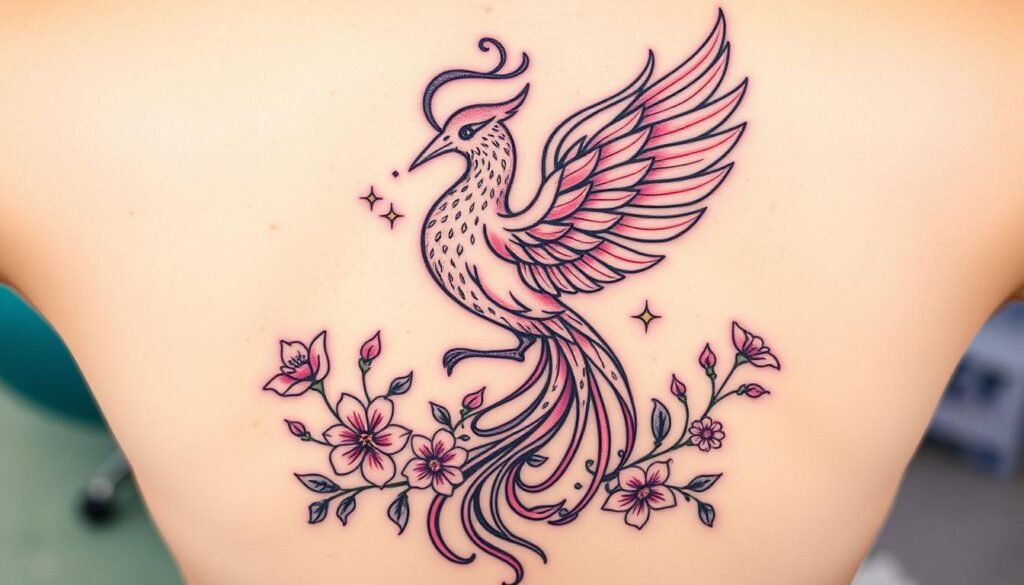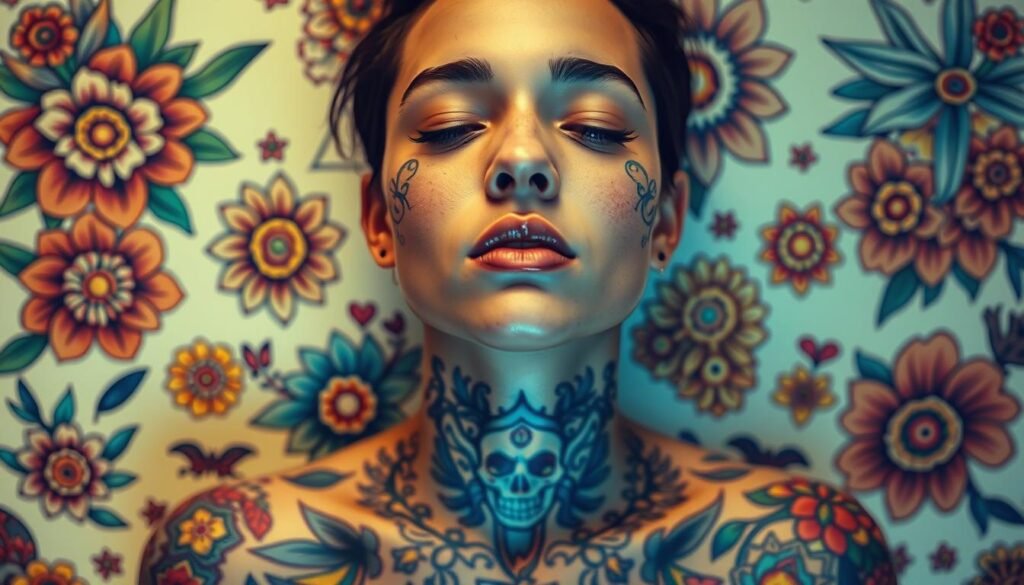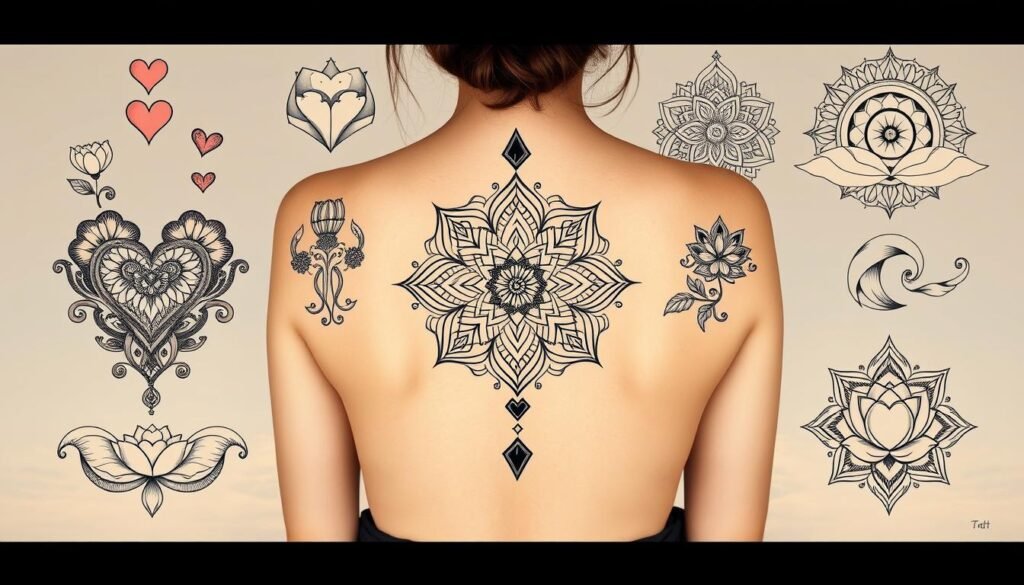Did you know that over 60% of mental health tattoo designs showcase resilience and rebirth symbols? Think of the butterfly, lotus flower, and phoenix. As attention to mental health grows, individuals are turning to tattoos. They use them to express themselves and accept their personal journey. Anxiety-related tattoos, in particular, are gaining popularity as more people use body art to show their battles and victories.
Tattoos are more than just for looks; they’re powerful symbols of strength. Stars like Selena Gomez have helped raise mental health awareness. They’ve done this by sharing tattoos with deep meanings, like the semicolon. This trend shows us how tattoos can start important talks on mental health and support healing.
Tattoos offer a means for self-exploration and affirming one’s value. Many people add meaningful designs to their bodies. They inspire others to pursue their paths toward loving themselves and improving mental health.
Key Takeaways
- Anxiety-related tattoos focus on symbols of resilience, like butterflies and phoenixes.
- Public figures like Selena Gomez promote mental health awareness through meaningful tattoo designs.
- The green ribbon tattoo symbolizes solidarity with those facing mental health challenges.
- Customization is key for cover-up tattoos related to self-harm scars.
- Lavender plant tattoos often symbolize a connection to anxiety for many individuals.
The Connection Between Anxiety and Self-Love
Anxiety and self-love are deeply connected. Understanding this relationship can greatly improve one’s life. Anxiety often comes from feeling bad about oneself. This is why loving oneself is key to fighting these feelings.
By practicing self-love, people can boost their self-esteem. This helps reduce anxiety and its negative impacts. There are many ways to grow self-love and feel better.
Common self-love practices include:
- Mindfulness meditation to enhance self-awareness
- Positive affirmations that reinforce self-acceptance
- Regular self-care routines promoting physical and emotional health
Experts have seen more people asking about tattoos related to anxiety. Tattoos have become a way for people to express themselves. They help people remember their fight against anxiety.
Many choose tattoos like butterflies, lotus flowers, and mandalas. These symbols represent change, hope, and calm.
https://www.youtube.com/watch?v=T243vn6HXTQ
There are also a lot of mental health resources available. These resources support the importance of self-love. Organizations encourage sharing stories and seeking support.
This helps people connect with others who understand their struggles. It creates a supportive community.
Practicing self-love is important for mental health and for those dealing with anxiety. It helps people appreciate their unique qualities. Fighting anxiety with self-love can lead to feeling free and transformed.
| Self-Love Practices | Benefits |
|---|---|
| Mindfulness Meditation | Improves self-awareness and reduces anxiety |
| Positive Affirmations | Boosts self-esteem and encourages positive thoughts |
| Self-Care Routines | Promotes physical and emotional well-being |
| Tattoo Art as Expression | Acts as a therapeutic outlet and personal reminder |
Exploring the Role of Tattoos in Mental Health
Tattoos deeply connect with mental health. They are meaningful symbols for folks on their mental health paths. The trend of tattoos is growing, linked to personal expression. A 2015 survey showed 29% of Americans have at least one tattoo. This indicates more people see tattoos as a way to speak out and express themselves.
People turn to tattoos to tell their personal stories. They design tattoos that symbolize their mental health battles. Tattoos often start conversations about mental health. This helps make talking about it more common. Getting a tattoo turns pain into strength. Stories on Instagram show how tattoos inspire chats on mental health.
Covering self-harm scars with tattoos is a growing trend. It’s a sign of recovery and strength. Tattoos are more than art; they’re a step in healing. For example, a tattoo inspired by “Comfortably Numb” by Pink Floyd showed someone’s emotional journey. It marked a big step in their mental health recovery.
Some feel proud of their tattoos, while others have regrets. Despite 23% feeling regret, many talk about the mental health benefits. Tattoos can represent both pain and healing. This shows tattoos have a complex meaning in people’s lives.

| Statistic | Details |
|---|---|
| Tattoo Ownership | 29% of Americans have at least one tattoo (2015 Harris poll). |
| Age at First Tattoo | 65% got their first tattoo by age 24. |
| Tattoo Regret | 23% of respondents reported tattoo regret (2015 survey). |
| Common Tattoo Parlor Usage | 80% had tattoos done in professional parlors. |
| Prevalence Among Younger Generations | Higher rates of tattooing noted among the “tattooed generation” born in the 1970s and 1980s. |
In summary, tattoos are a powerful way to share mental health stories. They encourage people to talk and connect over shared experiences. Tattoos bring important conversations about mental health into the open.
Symbolism of Anxiety Tattoos
Tattoos mean a lot, especially for those dealing with mental health. The symbolism of anxiety tattoos ties closely to resilience and growth. They show personal stories of struggle and victory over anxiety.
Common Designs and Their Meanings
Some tattoo designs stand out for mental health. They are not just art. They tell important stories:
- Semicolon: It’s like a pause in a sentence, meaning life goes on despite tough times. Celebrities like Selena Gomez support the Project Semicolon for suicide prevention awareness.
- Butterflies: They symbolize change and a new beginning, like moving through anxiety.
- Lotus Flowers: These represent purity and overcoming tough times. They bloom beautifully from mud.
- Barbed Wire: First used by criminals, it shows the hardships of prison life. Each spike can mean a year served.
- Green Ribbon: It’s a global sign of mental health awareness, sparking conversations about well-being.
- Broken Chains: This image means freedom from mental health struggles.
- Serotonin Molecule: This stands for the happiness hormone, reminding people of mental health’s biochemical side.
Personal Stories Behind Anxiety Tattoos
Stories about anxiety tattoos are powerful. They talk about change and healing:
“For many, a tattoo is a sign of strength and unity in their mental health journey. It turns past pain into hope and resilience.”
People share their stories, showing how tattoos reflect their fight and success. For some, it’s about turning self-harm into something positive. A study found 27% of those with tattoos felt better about themselves compared to those without.
These stories inspire and show that tattoos create a sense of community. They help people feel connected and continue talking about mental health awareness.
Through tattoos, people express their lives uniquely. They share and inspire others to face their fears and heal.
Anxiety Management Techniques Through Self-Expression
Art is a key way to handle feelings and boost mental health. Getting a tattoo is more than looking good; it’s a method to deal with anxiety. People put their emotions into their tattoos, turning feelings into powerful self-expression. This art form helps people face and handle their anxiety, making them feel strong.
Creative Outlets: The Therapeutic Value of Tattoos
Many find tattoos therapeutic. For instance, someone got a daisy tattoo mixed with semicolons to show their fight against anxiety. This tattoo isn’t just art; it symbolizes overcoming hard times and resilience. Another got a lavender tattoo, symbolizing their path to peace, showing how stories can be told through tattoos.
Tattoos can also help heal from past hurts. A person used tattoos to cover scars, connecting the design to their children. These tattoos do more than decorate the skin; they transform life stories into permanent symbols of growth and self-love. Using tattoos, people can celebrate their journeys and improve their mental health.
Tattooing is a powerful way to deal with anxiety. It helps people find their voice and take control of their story. Combining art and healing, tattoos are a crucial way for many to change their lives.

Anxiety, Self-Love, and Tattoos: Find Your Inner Strength
Tattoos are a strong way to show self-love and resilience. They are especially meaningful for those dealing with anxiety and mental health. Having a tattoo related to your journey can remind you of your growth. Every tattoo tells a story that is unique to its owner.
Transformative Power of Body Art in Self-Care
Tattooing can be a key part in improving mental health. People get tattoos that mark important life events or ideas that inspire them. For instance, butterfly tattoos symbolize change and freedom after tough times.
Lotus flower tattoos represent strength and starting anew, which fits those who have faced challenges. Then, there are seated meditator tattoos. These remind people to stay calm and focused amidst anxiety.
Tattoo Inspirations for Mental Health Journeys
Looking for tattoo ideas can connect you with your own story. Every design can boost self-awareness. Here are some examples:
- Semi-colon tattoos: They show the decision to keep going despite hardships.
- Barbed wire tattoos: These talk about overcoming difficult past events.
- Serotonin compound tattoos: They highlight the need to talk about mental health.
- Phoenix tattoos: Symbolize rising again after tough times.
- Lavender plant tattoos: Offer a gentle reminder of peace for those with anxiety.
- Koi fish tattoos: Show strength to overcome life’s challenges.
These tattoos do more than decorate the skin. They link personal battles to larger issues of mental health. Each one is a lasting symbol of self-love and personal progress. To learn more about mental health and tattoos, check out this useful resource.

| Tattoo Design | Symbolism |
|---|---|
| Butterfly | Transformation and freedom |
| Lotus Flower | Strength and resilience |
| Semicolon | Continuation through challenges |
| Koi Fish | Perseverance and strength |
| Phoenix | Rebirth and renewal |
| Lavender Plant | Signifies calm and anxiety relief |
Tattoos help people find their own voice. They show how self-care can truly make a difference. Embracing these designs helps connect more deeply with self-love and well-being.
Mindfulness and the Meaning of Tattoo Designs
Tattoo designs are more than art; they tell personal stories and express feelings. Being mindful when picking tattoos means the designs are really special to someone’s life. This careful selection turns getting a tattoo into a meaningful experience.
Take the semicolon tattoo, made famous by stars like Selena Gomez, for example. It shows the importance of talking about mental health. Such symbols help bring attention to mental health and suicide prevention.
Green ribbon tattoos support those facing mental health challenges. Tattoos of the serotonin compound talk about the fight and support for mental health. Some choose lavender tattoos to represent their personal battle with anxiety through beautiful designs.
The act of getting tattooed is a moment for personal reflection. It turns feelings into beautiful art. Designs like butterflies, phoenixes, and meditating figures remind the wearer to live in the moment and manage stress.
Some tattoos, like those covering scars, show how pain can lead to something beautiful. Tattoo artists work closely with individuals. Together, they create designs that symbolize healing and growth, like lotus flowers and animals.
| Design | Symbolism | Meaningful Aspect |
|---|---|---|
| Semicolon | Continuation of life | Raise awareness for mental health |
| Green Ribbon | Solidarity | Support for mental health challenges |
| Serotonin Compound | Happiness | Advocacy for mental health |
| Lavender Plant | Calmness | Connection to anxiety |
| Butterfly | Transformation | Ability to overcome struggles |
Being mindful when getting tattooed adds to the therapy it brings. It becomes more than art; it’s a way for personal expression. People use tattoos to share their stories and find power in their experiences.
Self-Love Affirmations Tied to Tattoo Art
Tattoo art is becoming a way to show self-love affirmations. It combines personal growth with art. People use tattoos to share their mental health journeys. They use designs that celebrate overcoming challenges and accepting oneself. Tattoos with positive messages create conversations about emotional health. They encourage those who have them.
Integrating Positive Messaging in Body Art
Tattoos are a popular way to express mental health journeys. Positive tattoos, featuring symbols like semicolons and lotuses, are getting more common. These symbols stand for strength and reminders of personal affirmations. Some key designs carry strong mental health meanings:
| Tattoo Symbol | Meaning |
|---|---|
| Semicolon | Represents the continuation of one’s life story despite hardships. |
| Lotus | Symbolizes overcoming struggles and emerging stronger. |
| Dandelion | Indicates letting go of the past and embracing new beginnings. |
| Anchor | Reflects stability and grounding in emotional turmoil. |
| Heart with Flowers | Denotes self-acceptance and personal growth. |
These designs do more than decorate the skin. They send strong messages about mental health. Tattoos about self-love show a person’s path to feeling empowered. They remind someone of their value and resilience. Using tattoos for self-love affirmations helps people see healing as a path of celebration and self-care.
Connecting with Others: Support Groups and Tattoos
Tattoos can be a strong way to connect with others about mental health. People in anxiety support groups often feel united by their tattoos. Designs like a semicolon, butterfly, or lotus flower tell stories of resilience and overcoming hard times.
Stories from about 30 people with recovery tattoos tell us about self-love and hope. Their tattoos help them feel they belong in their groups. By sharing their journey in art, they create connections.
Music is also key in their recovery, with bands like Twenty One Pilots and All Time Low being big influences. Art, music, and community together offer a full way to tackle mental health issues. Support groups can get stronger with these creative outlets.
By sharing tattoo stories, group members build trust and understanding. Symbols like the green ribbon start important talks about mental health. Showing off these tattoos reminds everyone they’re not fighting alone.
Using tattoos as symbols of healing helps people commit to getting better. It brings a sense of unity to anxiety support groups. Tattoos become more than ink; they’re a support network. For more on the power of tattoos in mental health awareness, click here.
Healing Through Body Art: Personal Narratives
Tattoos are more than skin decorations; they tell personal tattoo stories. These stories symbolize each person’s healing journey. Many share how tattoos help them recover and show their resilience. They empower people to take back their body and identity.
The semicolon tattoo represents hope and continuing life, linked to Project Semicolon’s work on suicide prevention. The green ribbon tattoo symbolizes mental health awareness. It reminds people to share their experiences.
Those facing anxiety might choose a lavender tattoo for its calming effects. These designs symbolize personal battles and victories in a healing journey.
The butterfly tattoo symbolizes change and strength after tough times. Barbed wire tattoos represent survival through pain, while phoenix tattoos show rebirth and strength. Memorial tattoos help people deal with loss, keeping memories alive.
Studies show tattoos boost self-esteem and aid in overcoming hardships. They are a mix of past struggles and future hope.
| Tattoo Design | Symbolism | Significance in Healing Journey |
|---|---|---|
| Semicolon | Hope and Continuation | Shows strength in mental health battles |
| Green Ribbon | Mental Health Awareness | Encourages talking about mental health |
| Lavender Plant | Calmness and Anxiety Relief | Helps deal with anxiety |
| Butterfly | Transformation and Resilience | Means overcoming hard times |
| Phoenix | Rebirth and Strength | Stands for rising stronger after challenges |
Tattoos reflect the essential parts of body art and recovery. They open paths to healing and accepting oneself. Each tattoo shares a unique story etched in skin.
Conclusion
The link between anxiety, self-love, and tattoos offers a fresh view on healing. Tattoos have become more popular, with people seeing them as symbols of their mental health journeys. Using tattoos to tell your story helps with self-acceptance and reminds you of your strength and growth.
Tattoos can symbolize empowerment and be a way to deal with life’s troubles. Getting a tattoo can be a form of self-care. It allows people to celebrate their life stories. This movement helps people understand themselves better and feel proud of who they are.
It’s key to see how art can help heal as we connect anxiety, self-love, and tattoos. People use tattoos to honor their stories and what they’ve gone through. This helps link their mental health with their identity, showing the power of embracing your own narrative.